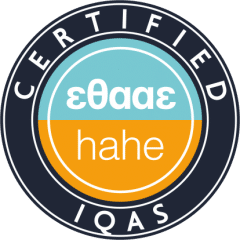Digital Libraries provide access to a variety of information resources and offer new potential for their use and for developing new services. Digital Libraries must not be seen just as the information software, known as digital library management system, but as a complex, multi-level organization, that includes content, procedures, policies, technology components, administrative users and end-users. The course provides a complete overview of different approaches and tools for Digital Libraries development, the related social and legal topics and new technologies and standards. The course offers both theoretical and practical education opportunities through a series of lectures and the use of the department’s digitization lab. The course aims to help students in the following objectives:
- Understanding: The main goal is to identify and understand the components that a Digital Library is comprised of, the methodologies for implementation and collection development, the various formats of analog and digital material, the digitization process and its importance, the legal implications, software and metadata issues, the emergence of digital preservation necessity
- Analysis: Students will be able to identify, study and analyze the Digital Libraries major challenges, such as material preservation and selection, digitization-specific requirements, legal implications, selection of the proper software system and metadata scheme, policy guidelines creation, user-behaviour aspects and user interface design evaluation, digital preservation issues
- Composition: By attending the Digital Libraries course, students will be able to organize, manage and implement small and large-scale digitization projects, following all the necessary steps (policies, content selection, content preservation, technical requirements definition, equipment selection, capturing process, produced files organization and management, metadata creation etc.). Also, students will be able to organize and manage Digital Libraries development or be employed to work in organizations that have already developed and operate a digital
- Evaluation: Students will be provided with the ability to evaluate all aspects of Digital Libraries. Specifically, students will be able to determine the level of conformance of the DL under evaluation, as far as concern the digitization outcome quality, the metadata scheme appropriateness and completeness, the digital library management system services, the user interfaces friendliness and usability level, the digital preservation readiness, legal issues arising from content selection etc.
The course is divided into the following sections:
- Section 1 – Digital Library Collection Development: Digital Collection Development Policy, Collection Development Criteria, Collection Assessment, Legal Issues in Collection Development, Copyright Protection, Exemptions for Libraries and Archives, Fair Use, Copyright Infringement and Fair Use Cases, Collection Sharing and Large-Scale Digital Libraries, Collection Development in Consortia and Large-Scale Digital Libraries, Large-Scale Digitization Projects and Collection Development Policy, Challenges of Collection Development, Legal Challenges.
- Section 2 – Digitization of Text and Still Images: Why Digitize: Access and Preservation, Digitization Process, Digitization Steps, General Digitization Guidelines, Digitization of Textual and Static Visual Resources, Technical Factors, Digitization Equipment, Recommendations for Digital Capture of Text and Photographic Images, Rapid
- Section 3 – Digitization of Audio and Moving Image Collections: The state of Audio and Moving Image Collections, Preservation Crisis: Obsolescence and Deterioration, Audio Digitization, Technical Factors, Audio Digitization Process, Equipment, Recommendations for Audio Digitization, Moving Image Digitization, Moving Image Types, Digitization Process and Equipment, Technical Factors and Recommended Specifications, Encoding and File
- Section 4 – Metadata: Overview, Definitions, Standards, and History, Functions and Types of Metadata, Metadata Schemas, Dublin Core, Metadata Object Description Schema (MODS), Metadata Encoding and Transmission Standard (METS), Text Encoding Initiative (TEI), Encoded Archival Description (EAD), Visual Resources Association (VRA) Core, Categories for the Description of Works of Art (CDWA), Interoperability: Metadata Mapping and Harvesting, Designing and Implementing Metadata, Selecting a Schema, Metadata Application Profiles, Controlled Vocabularies, Building Metadata, User Tagging, Linked Data, Linked Data Model and Technologies, Linked Data and Digital
- Section 5 – Digital Library Management Systems – DLMS: Design and Architecture of Digital Library Systems, Architectural Models, Functionality and Other System Requirements, Interoperability, Current Landscape of DLMS, Open Source versus Proprietary Software, Open Source Systems, Proprietary Systems, Open Source Repository Systems, Selection of DLMS
- Section 6 – Digital Preservation: Defining Digital Preservation, Terminology: Digital Curation, Digital Stewardship, and Digital Preservation, Definitions of Digital Preservation in the Practice Community, Understanding Digital Preservation in the Context of Digital Libraries, Preserving Digital Content, Digital Preservation Challenges, Digital Preservation Goals, Digital Preservation Strategies, Digital Preservation in Digital Library Practice, Practical Guidelines, Digital Preservation Technology: Standards and Repositories, Standards, Digital Repositories, Preservation Repository Software, Partnerships and Hosted Services



